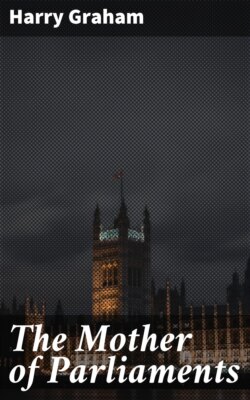Читать книгу The Mother of Parliaments - Graham Harry - Страница 3
На сайте Литреса книга снята с продажи.
PREFACE
ОглавлениеTable of Contents
The history of England's Parliament is the history of the English people. To the latter it must consequently prove a source of never-failing interest. That it does so is clearly shown by the long list of writers who have sought and found inspiration in the subject. To add to their number may perhaps seem an unnecessary, even a superfluous, task. This volume may indeed be likened to that "Old Piece in a New Dress" to which Petyt compared his Lex Parliamentaria. "These things, men will say, have been done before; the same Matter, and much the same Form, are to be found in other Writers, and this is but to obtrude upon the World a vain Repetition of other men's observations." But although the frank use of secondhand matter cannot in this case be denied, it is to be hoped that even the oldest and most threadbare material may be woven into a fresh pattern, suitable to modern taste.
In these democratic days a seat in either House of Parliament is no longer the monopoly of a single privileged class: it lies within the reach of all who can afford the luxury of representing either themselves or their fellows at Westminster. It is therefore only natural that the interest in parliamentary affairs should be more widely disseminated to-day than ever. It does not confine itself to actual or potential members of both Houses, but is to be found in the bosom of the humblest constituent, and even of that shadowy individual vaguely referred to as the Man in the Street. Though, however, the interest in Parliament is widespread, a knowledge of parliamentary forms, of the actual conduct of business in either House, of the working of the parliamentary machine, is less universal.
At the present time the sources of information open to the student of parliamentary history may roughly be regarded as twofold. For the earnest scholar, desirous of examining the basis and groundwork of the Constitution, the birth and growth of Parliament, the gradual extension and development of its power, its privileges and procedure, the writings of all the great English historians, and of such parliamentary experts as Hatsell, May, Palgrave, Sir William Anson, Sir Courtenay Ilbert and Professor Redlich, provide a rich mine of information. That more considerable section of the reading public which seeks to be entertained rather than instructed, can have its needs supplied by less technical but no less able parliamentary writers—Sir Henry W. Lucy, Mr. T. P. O'Connor, Mr. MacDonagh—none of whom, as a rule, attempts to do more than touch lightly upon fundamental Constitutional questions.
The idea of combining instruction with amusement is one from which every normal-minded being naturally shrinks: the attempt generally results in the failure either to inform or entertain. There does, however, seem to be room for a volume on the subject of Parliament which shall be sufficiently instructive to appeal to the student, and yet not so technical as to alarm or repel the general reader. It is with the object of supplying the need for such a book that the following pages have been written.
An endeavour to satisfy the tastes of every class of reader and at the same time to cover the whole field of parliamentary history within the limits of a single volume, must necessarily lead to many errors of admission as well as of omission. The material at the disposal of the author is so vast, and the difficulties of rejection and selection are equally formidable. Much of the information given must perforce be so familiar as to appear almost hackneyed. Many of the stories with which these pages are sprinkled bear upon them the imprint of extreme old age; they are grey with the cobwebs of antiquity. But while the epigram of the past is too often the commonplace of the present, the witty anecdote of one generation, which seems to another to plumb the uttermost abysses of fatuity, may yet survive to be considered a brilliant example of humour by a third. The reader, therefore, who recognises old favourites scattered here and there about the letterpress, will deride or tolerate them in accordance with the respect or contempt that he entertains for the antique.
I cannot lay claim to the possession of expert parliamentary knowledge, though perhaps, after close upon fifteen years' residence within the precincts of the Palace of Westminster, I may have acquired a certain intimacy with the life and habits of the Mother of Parliaments. For my facts I have to a great extent relied upon the researches of numerous parliamentary writers, past and present, to whom I have endeavoured to express my indebtedness, not only in copious footnotes, but also in the complete list of all sources of information given at the end of this volume. I wish to express my thanks to the many friends and acquaintances who have so kindly assisted me with their counsel and encouragement; to Mr. Kenyon, Mr. Sidney Colvin and the officials of the Print Room and Reading Room at the British Museum; to Sir Alfred Scott-Gatty, Garter King-at-Arms; to Mr. Edmund Gosse, Librarian of the House of Lords, and other officers of both Houses. My thanks are particularly due to Sir Henry Graham, Clerk of the Parliaments, who placed his unique parliamentary experience at my disposal, and whose invaluable advice and assistance have so greatly tended to lighten and facilitate my literary labours.
H. G.
